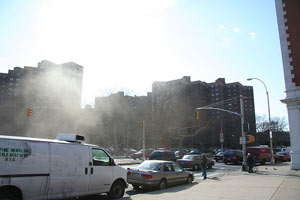|
The Disadvantages of BiodieselSearch this site! There are few disadvantages of biodiesel. It poses no economical disadvantages, scant environmental concerns, and a handful of vehicular inconveniences. Here are some of the Vehicular Concerns:
Here are some of the Vehicular Concerns:• Biodiesel's cloud and pour points are are reached before that of petrodiesel, which can cause fuel lines and filters to clog in cold weather. Therefore, petrodiesel performs better than B-100 in cold weather. However, a blend of B20 would be very resistant to gelling. Photo courtesy of Dan Phiffer • Biodiesel has proven incompatible with Buta-N or nitrile rubber. This rubber can be found in the fuel pump and fuel lines. If your vehicle was manufactured prior to 1994, it may have components made with this rubber. Biodiesel can dissolve this material. If you need to replace these parts, try to find Viton parts as these work well with biodiesel. • Biodiesel problems can also be caused by it's solvent properties. Biodiesel may cause existing petroleum build-up to loosen and clog filters and fuel lines. When you begin using biodiesel, just carry a spare fuel filter with you for the first few thousand miles until all all the old petroleum build-up has had a chance to get flushed out. • Biodiesel has a lower energy content than petrodiesel. According to the EPA, plant-based biodiesel averages 4.6% less energy per gallon, animal-based biodiesel 10.6 less per gallon (than petrodiesel). • Some engine manufacturers will void parts and workmanship warranties when blends greater than B20 are used. • Click here for information on
engine damage.
• It may increase Nitrogen oxide emissions up to 10%, according to EPA.
With hardly any environmental concerns, and few biodiesel problems that can't be easily remedied, biodiesel seems like a pretty good option!
Return from 'Disadvantages of Biodiesel' to 'Biodiesel FAQ'
|
